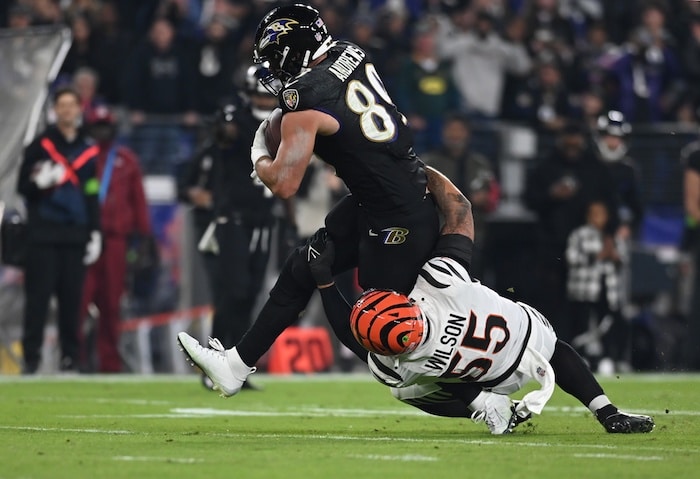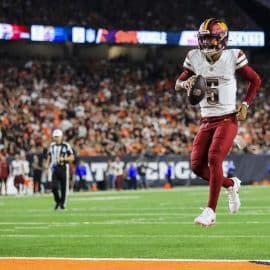The hip-drop tackle is now illegal. On Monday, the NFL owners approved a rule change to ban the swivel hip-drop tackle during the Annual League Meeting in Orlando, FL.
NFL Bans Swivel Hip-Drop Tackle: Details Of Rule Change
Here’s the video the NFL just showed in a press conference of what are now banned swivel hip-drop tackles (with NFL executive Jeff Miller speaking in the background). pic.twitter.com/Y4H8h6pQkW
— Tom Pelissero (@TomPelissero) March 25, 2024
The official rule (via NFL):
“ARTICLE 18. HIP-DROP TACKLE. It is a foul if a player uses the following technique to bring a runner to the ground:
(a) grabs the runner with both hands or wraps the runner with both arms; and
(b) unweights himself by swiveling and dropping his hips and/or lower body, landing on and trapping the runner’s leg(s) at or below the knee.
Penalty: For a Hip-Drop Tackle: Loss of 15 yards and an automatic first down.”
Contrary to popular belief, the hip-drop tackle is still allowed. However, it’s the swivel technique that has been banned.
“Because this isn’t the elimination of hip-drop, this is an elimination of a swivel technique that doesn’t get used very often,” NFL Competition Committee chairman Rich McKay said Monday. “When it is used, it is incredibly injurious to the runner — the runner is purely defenseless.”
Last week, NFL executive vice president of football operations Troy Vincent said that the hip-drop tackle is “something we want to get out the game” because of its high injury rate. However, the play will likely be enforced like the NFL’s “use of helmet” rule, with warnings and fines issued to players instead of flags.
NFL EVP of football ops Troy Vincent reiterated on a media call the hip-drop tackle is “something we want to get out the game.”
His message to players, whose union opposes a ban? “When you have a play that has a 20-25x injury rate, it doesn’t allow you to fulfill your dreams.”
— Tom Pelissero (@TomPelissero) March 21, 2024
NFL Players Speak Out Against Swivel Hip-Drop Ban
Our statement on the swivel hip-drop tackle. pic.twitter.com/8mzhjtPgKu
— NFLPA (@NFLPA) March 20, 2024
Several former and current NFL players have spoken out against the ban.
Former NFL cornerback and current analyst Richard Sherman believes the move to ban the hip-drop tackle will only take away money from defensive players due to future fines.
He’s not. He’s just supposed to let them score and cost his team. They are taking the Defensive players money. All these fines for defensive players doing their job. They could not coach him on how to get a 270lbs TE down while running. Smh https://t.co/SyHvp848QP
— Richard Sherman (@RSherman_25) March 25, 2024
Former NFL quarterback and current ESPN analyst says the rule change “makes it nearly impossible for defenders to play defense anymore.”
Banning the hip-drop tackle is yet another rule change that makes it nearly impossible for defenders to play defense anymore. The NFL needs less penalties not more. The NFL needs less fines not more. At this point, we might as well throw flags on them. pic.twitter.com/CEwx0Afc3d
— Robert Griffin III (@RGIII) March 25, 2024
Former NFL defensive end and current CBS analyst J.J. Watt implied the league is turning into flag football.
Just fast forward to the belts with flags on them… https://t.co/yToh5XKVMS
— JJ Watt (@JJWatt) March 25, 2024
The NFL approved two other rule changes.
- Amends Rule 15, Section 1, Article 1, changing the challenge rule. Whereas previously, coaches needed to get each of their first two challenges correct to get a third, they simply must get one correct to get another shot at dropping the red flag.
- Amends Rule 14, Section 5, Article 2, changing the enforcement of a major foul by the offense prior to a change of possession in a situation where both teams have committed fouls.
Add The Sports Daily to your Google News Feed!







